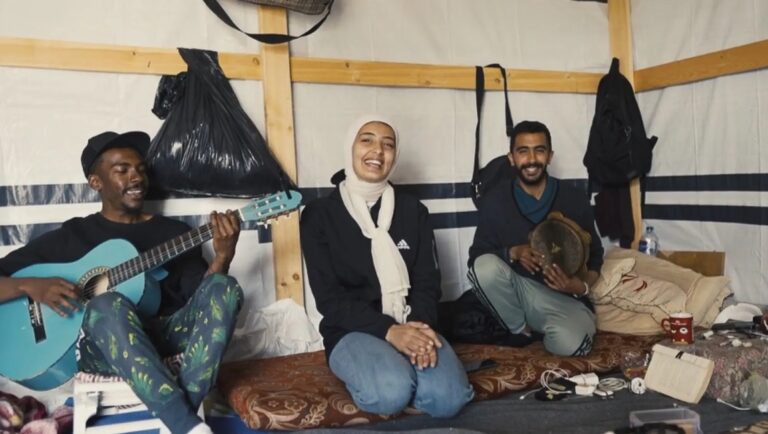From Ground Zero is an anthology of 22 stories from Gaza curated by Rashid Masharawi. The shorts range from straightforward documentations of daily life under the siege to more elaborate autofictions staged in the rubble. It’s clear to see the limitations imposed on each filmmaker by the circumstances surrounding their practice — traditional systems of filmmaking are eschewed in favor of neorealist style (one of the best examples comes second in the series, Muhammad Al Sharif’s No Signal). The quality of each short varies, though every film contributes to illuminating another in some way. In Tamer Nijim’s The Teacher, the titular instructor (Alaa Nijim) wanders from ration line to ration line in search of food, water, and electricity, only to find all available supplies exhausted, until at last, a former student offers him help. In Ahmed Al Danaf’s A School Day, a schoolboy (Yahya Saad) also wanders the streets only to wind up studying at what is revealed to be the grave of his former teacher. Song and dance also make many appearances — as in Al Balbisi’s Charm, which layers vertical videos of dance on Kenzi Al Balbisi’s own Dabke. A young boy plays makeshift drums in Karim Satoum’s Hell’s Heaven, and a group bands together to sing and make music in Hana Eleiwa’s NO.
The genocide also disrupts artists more broadly: All is Fine, directed by Nidal Damo, tells the story of a comedian who prepares for a standup routine in Al Nuseirat only to arrive to find the entire block destroyed. Neda’a Abu Hasna’s Out of Frame focuses on a painter and sculptor (Ranin Al Zeriei) who takes the audience on a tour of her works in a bombed-out room — some destroyed, all without a home as the university Zeriei had hoped to apply to with them was destroyed. Filmmaking as film subject is also featured prominently. In Sorry, Cinema, directed by Ahmed Hassouna, the filmmaker narrates his difficulties as a Palestinian filmmaker, before eventually destroying his own film slate for use as kindling. Etimad Washah’s Taxi Wanissa follows a donkey used as a taxi, whose narrative is interrupted by Washah as she explains that part way through filming, her brother died and she lacked the will to complete the short as imagined — her testimony the only conclusion she could imagine appropriate. Khamis Masharawi’s Soft Skin features children making a stop-motion picture about how the siege has impacted their lives. There is debate about which story is best to tell, before the group comes to a consensus that they will recreate a conversation between a girl and her brother. “If they bomb us, we’ll be in pieces,” the girl explains as she reveals that her name has been written on her arm with a marker. It will be used to identify the children should they be killed.
In the face of all this, From Ground Zero is startlingly unpolitical in its expositions of the genocide, principally because its enemy is never named. The citizens of Gaza are the film’s focus. They are constantly seeking refuge, but from what? They are mercilessly killed, but by whom? There is an understanding that their infrastructure is being bombed indiscriminately, but no name is mentioned for the military that has reduced these cities to ruins. This does not mean that the films do not provide a context to understand what is happening. The last short, Awakening (directed by Mahdi Kreirah), is told through makeshift tin cans-and-string puppets and takes place as an explosion rocks a family’s tent. The father, Khaled, awakens from his sleep only to discover that he has been without his memory since the 2014 war on Gaza, now with a 10-year-son, Majd, who his wife Seham was pregnant with at the time. Upon learning of his family’s condition as refugees, he wonders: “Have I awoken in the future or the past? Wasn’t the Nakba in 1948?” In the film’s final moments, the camera reveals the “actors” behind the puppets: they are children. And then, a parting song: “Every day, the siege, every day, we sing. They destroy and we rebuild.”
DIRECTOR: Various Directors; DISTRIBUTOR: Watermelon Pictures; IN THEATERS: January 3; STREAMING: January 28; RUNTIME: 1 hr. 52 min.
Published as part of January 2025 Review Roundup


Comments are closed.